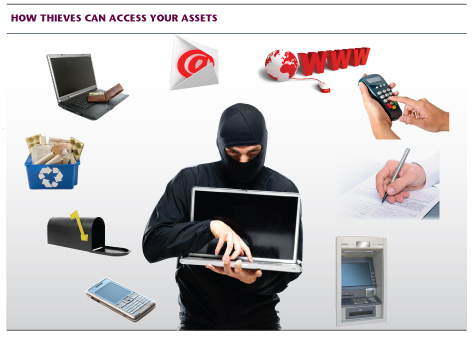Watching out for fraud

It can occur where you least expect it.
Has your financial institution recently asked you to replace your debit card because it may no longer be secure? This is happening more and more frequently and it indicates just how vigilant card issuers must be, as well as the sophisticated means they are now using to spot cloning and other fraudulent activity..
Unfortunately, financial fraud is now widespread, and digital technology has made it even more pernicious.
Does danger really lurk everywhere?
While there’s no need for paranoia, it is important to know where the danger lies in order to take preventive action. Financial institutions have limited liability and we all have to take the necessary precautions, or else risk some unpleasant surprises.
Exactly what kind of danger are we talking about? There are three basic types:
• Theft of
bank account access codes
Thieves get into your bank accounts, either through the Internet or by cloning
your debit card, and they use your money to pay for their transactions.
• Identity
theft
People
use your personal information to obtain credit, usually at a retailer, and you
get the bill.
• Telecommunication
piracy (computers, telephones, etc.)
Fraud
artists get into your system and use it for their purposes. With phone systems,
for example, they take control of your lines and make long-distance calls that
get charged to you.
Is the threat that serious?
Each type of fraud may seem easy to prevent, but it’s a sizable challenge when you consider the many places and situations that put you at risk.

Some basic precautions
Nobody can ever be completely fraud proof, but there are some basic steps you can take to prevent some of the worst from happening.
• Pay
attention to your mail.
Fraudsters
can get hold of your mail before you receive it. If a statement doesn’t
arrive at its usual time, contact the issuer. Consider replacing your mailbox with
one that locks.
• Watch your
waste.
Shred
all documents that have your name, address or other personal information on
them, particularly credit card application forms and your expired credit cards.
Never put anything with personal information in the recycling bin.
• Don’t give
out information to just anyone.
Retailers
need only your money. If a merchant asks for your address, postal code or
driver’s license, take your business elsewhere.
• Never
respond to email requests.
Your financial institution will never ask you to confirm information by
email. Delete any such emails immediately, even if it has the right logo and
the address seems perfectly legitimate. This practice is known as phishing.
• Change
your access codes.
We’re
always being told to do this regularly, but we all have so many codes and
passwords, it seems like an impossible task. At least do it for your bank
cards. Fraud artists can access your codes remotely while you are at an ATM.
Changing your code frequently makes life more
difficult for them. As for your online codes and passwords, consider using
secure services that generate your passwords for you, so that you don’t have to
memorize them all and change them one at a time.
• Check your
credit file.
You are entitled to receive a free copy of your credit file every year. If fraudsters
have used your identity to obtain credit, you’ll be able to spot the abnormal
activity. See our previously published article
on this subject
Asset misappropriation
In addition to these daily risks, there are, of course, the swindlers and Ponzi
schemers who pretend to be investing your hard-earned money but in fact are
using it for their own purposes.. Always make sure that anyone who approaches
you with investment recommendations is duly recognized by the regulatory
authorities, has a spotless record, and is affiliated with a trustworthy
institution.
Last but not least, keep in mind that no dignitary from Nigeria or any other African nation needs access to your bank account for any reason other than to empty it!
![]()
In collaboration with Desjardins Financial Security Independent Network.
Confidentiality Policy | Contact editorial team
© All rights reserved. Desjardins Financial Security Independent Network 2025.
Desjardins Financial Security Independent Network is a registered trademark owned by Desjardins Financial Security. Mutual Funds representatives act on behalf of Desjardins Financial Security Investments Inc.
Mutual Funds are offered through Desjardins Financial Security Investments Inc.
